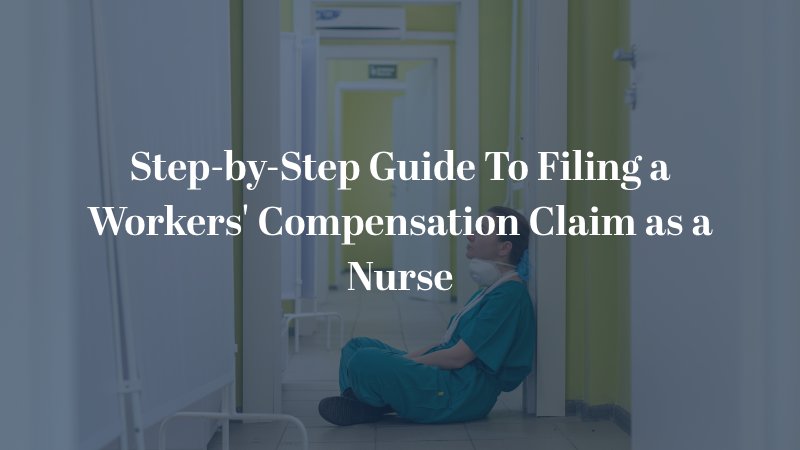Workers’ compensation acts as a lifeline for employees who have been injured on the job or contracted illnesses due to workplace conditions. This system provides financial benefits to cover medical expenses, lost wages and more. It operates under a no-fault policy – meaning regardless of whether you or your employer bear responsibility for the accident, you’re still entitled to workers’ comp benefits.

In healthcare sectors like nursing where risk of occupational injuries runs high, this compensation framework is of paramount importance. It’s helpful to understand common injuries and what steps you can take to make sure your D.C. nurse workers’ compensation claim is a success.
Common Workplace Injuries Suffered By Nurses
Being a nurse presents numerous potential risks of injury due to the demands and environment of the job. Some of the most common workplace injuries for nurses include the following:
Musculoskeletal Injuries: Nurses often do heavy lifting when assisting patients, which can lead to various musculoskeletal problems like back strains, sprained wrists, or neck injuries.
Needlestick Injuries: Accidental pricks from needles (especially those used on patients) could potentially expose nurses to bloodborne diseases such as Hepatitis B and C or HIV/AIDS, among others, thereby posing severe health risks.
Slips and Falls: Wet floors, cluttered corridors, or even poorly lit workspaces can cause slips and falls resulting in fractures or head traumas with severe implications.
Violence-Induced Injury: Unforeseen situations may arise where violent outbursts by distressed patients or visitors occur, causing physical harm.
Stress-Related Illnesses: The high-pressure nature associated with the nursing profession frequently leads to ailments triggered by extreme stress, like heart conditions, sleep disorders, and anxiety, to name a few.
It’s evident that nursing has its fair share inherent occupational hazards, and knowing what to look out for and what steps to take is essential.
What To Do After Suffering a Workplace Injury as a Nurse
After being injured and identifying that it occurred on the job, the next crucial step is knowing how to properly file a workers’ compensation claim to ensure you receive what’s due to you. Here’s what you should do:
Report the Incident Promptly: Make sure that you report your injury or occupational illness to your employer within 30 days. This should be done via DCWC Form 7, titled “Employee’s Notice of Accidental Injury or Occupational Disease.” Always keep records about when and where the incident was reported.
File a Written Claim for benefits: You also need to put in writing a detailed account of the accident using DCWC Form 7a known as ”Employee’s Claim Application.” This must be done within one year from the date you were injured. If you fail to do this ,you will lose out on the chance to obtain the benefits you’re owed.
Seek Medical Assistance: Besides reporting your injury, another absolutely vital component involves seeking immediate medical attention after your injury. This not only ensures you are healthy and safe, but also serves as clear evidence that you were actually injured, bolstering your claim’s credibility. It also provides evidence of your medical expenses.
Gather Necessary Evidence: Even though workers’ compensation operates on a no-fault basis, being equipped with solid evidence improves your chances of receiving your deserved benefits.
Photos or videos showcasing the accident scene and injury can show the extent of your injuries and substantiate your claim. Witness Testimonies are also important, as this provides another way to verify what happened and increase your odds of receiving benefits.
Understand Why Claims Are Denied
Knowing why claims often face rejection can be insightful to help you evade similar fate. Here are some reasons claims are denied:
Injury Did Not Occur at Work: Workers’ compensation applies solely to injuries that occur on the job. Should it be proven that your injuries occurred in a different manner, your claim will be denied.
Delay in Reporting: If you don’t notify your employer about an injury within the stated time frame, insurers have grounds to deny the claim.
Under The Influence: If your injury occurred while you were under the influence of drugs and/or alcohol, your claim will likely be denied right away if there is evidence of this fact.
Pre-existing Medical Conditions: If an insurer finds out that your claimed work injury is just a pre-existing condition, they will deny your claim. You can still sometimes obtain benefits if your pre-existing injury was worsened during your job duties, but it’s more difficult to collect in this scenario.
Keep these points in mind while filing any claims.

The Importance of Working With a Lawyer
If you’re ever injured at work and claiming workers’ compensation, legal representation is strongly advised. Here’s how working with a lawyer can help:
Case Evaluation: Lawyers can assess the merits of your case, provide specific advice on potential benefits, and assist you throughout the claim.
Expert Negotiation: Having seen numerous similar cases before, workers’ compensation lawyers are skilled in negotiating with insurance companies. This plays a crucial role in receiving maximum compensation and may allow you to get what you’re entitled to without having to take further legal action.
Claim Preparation and Presentation: Experienced workers’ compensation lawyers are proficient in gathering evidence necessary for your claim while taking care to present it effectively during negotiations and any other legal proceedings.
Dispute Resolution: Dispute resolution, in the context of workers’ comp claims, is a process where disagreements between you and your employer or insurance company are settled. These disputes could arise over issues like the extent of injuries, amount payable as benefits, or whether an injury was indeed work-related.
The journey through a workers’ compensation claim may seem demanding, particularly when you’re in midst of dealing with an injury or illness. But by understanding the common injuries unique to nursing professionals, being aware of the steps involved in filing your claim efficiently and effectively, as well as potential reasons why claims often face denial, you equip yourself with necessary tools to file a successful claim.
If you need help, don’t hesitate to reach out to us to schedule a free consultation.